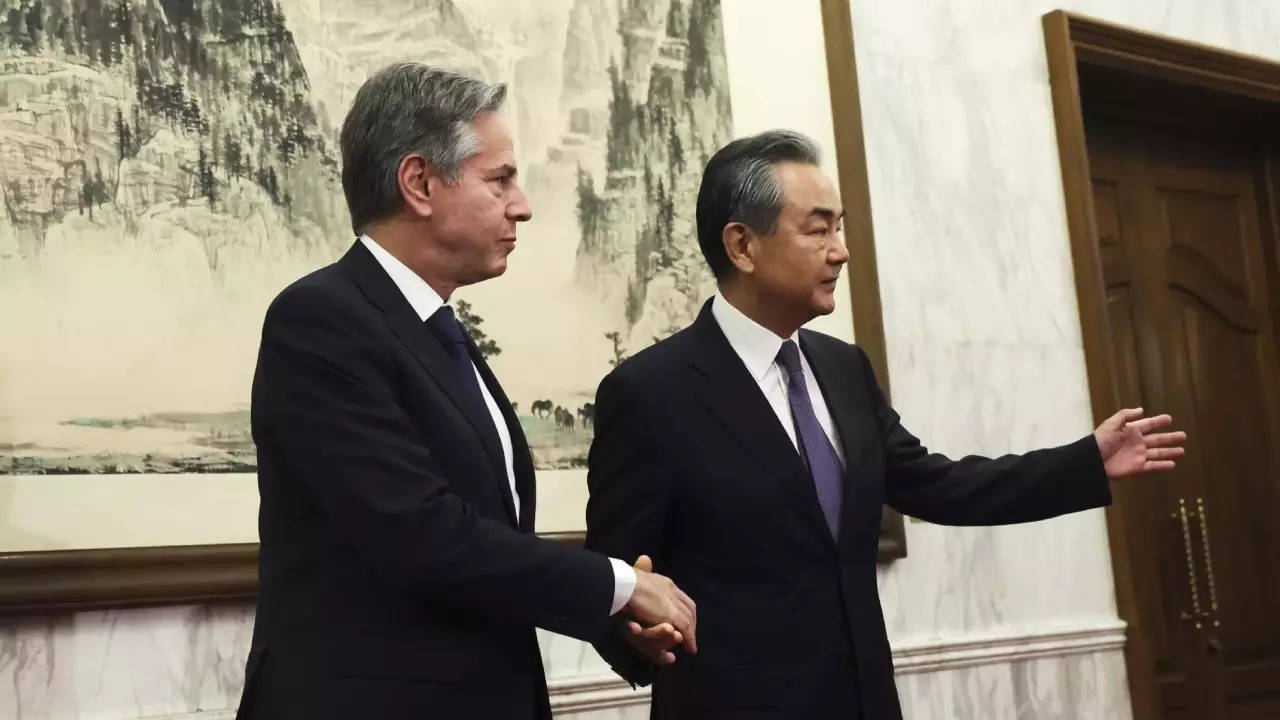
[ad_1]
BEIJING: China and the United States agreed on Monday to stabilise their intense rivalry so it doesn’t veer into conflict but failed to produce any major breakthrough during a rare visit to Beijing by US secretary of state Antony Blinken.
Chinese President Xi Jinping welcomed “progress” after shaking hands with Blinken at the Great Hall of the People, a grand venue usually reserved for greeting heads of state.
The top US diplomat and Xi both stressed the importance of having a more stable relationship, as any conflict between the world’s two largest economies would create global disruption. However, China refused to entertain Washington’s bid to resume military-to-military communication channels and cited US sanctions as the obstacle. China’s defence minister Li Shangfu, who came into post in March, has been sanctioned since 2018 over the purchase of combat aircraft and equipment from Russia’s main arms exporter, Rosoboronexport.
The two sides appeared entrenched in their positions over everything from Taiwan to trade, including US actions toward China’s chip industry, human rights and Russia’s war against Ukraine. At one of the most significant US-China exchanges since President Biden took office, it was not clear how they would overcome their differences, but they agreed to continue their diplomatic engagements with more visits in the coming weeks and months.
At a news conference concluding his two-day trip to Beijing, the first by a US secretary of state since 2018, Blinken said Washington had achieved its objectives for the trip, including raising its concerns directly, trying to set up channels for dialogue and exploring areas of cooperation. The trip was postponed in February after a suspected Chinese spy balloon flew over US airspace. But he said progress was not straightforward. “It’s not the product of one visit, one trip, one conversation. My hope and expectation is: we will have better communications, better engagement going forward. ” His meetings in Beijing, including talks with China’s top diplomat Wang Yi and foreign minister Qin Gang, had been “candid and constructive”, he added. Blinken raised contentious issues such as Taiwan, human rights, North Korea’s provocations and US concerns with Beijing’s intelactivities in Cuba, the state department said.
“The two sides have also made progress and reached the agreement on some specific issues. This is very good,” Xi told Blinken across a long table. It was not clear from Xi’s remarks what progress he was referring to, although he told Blinken that China “hopes to see a sound and steady China-US relationship” and believes that the two countries “can overcome various difficulties”, according to a Chinese readout of the talks. He also urged the US not to “hurt China’s legitimate rights and interests”, a signal of potential flashpoints such as Taiwan, the democratic island Beijing claims as its own.
The lack of open communication channels between the two nations has sent jitters around the world, and Beijing’s reluctance to engage in regular military-to-military talks with Washington has alarmed China’s neighbours.
Chinese President Xi Jinping welcomed “progress” after shaking hands with Blinken at the Great Hall of the People, a grand venue usually reserved for greeting heads of state.
The top US diplomat and Xi both stressed the importance of having a more stable relationship, as any conflict between the world’s two largest economies would create global disruption. However, China refused to entertain Washington’s bid to resume military-to-military communication channels and cited US sanctions as the obstacle. China’s defence minister Li Shangfu, who came into post in March, has been sanctioned since 2018 over the purchase of combat aircraft and equipment from Russia’s main arms exporter, Rosoboronexport.
The two sides appeared entrenched in their positions over everything from Taiwan to trade, including US actions toward China’s chip industry, human rights and Russia’s war against Ukraine. At one of the most significant US-China exchanges since President Biden took office, it was not clear how they would overcome their differences, but they agreed to continue their diplomatic engagements with more visits in the coming weeks and months.
At a news conference concluding his two-day trip to Beijing, the first by a US secretary of state since 2018, Blinken said Washington had achieved its objectives for the trip, including raising its concerns directly, trying to set up channels for dialogue and exploring areas of cooperation. The trip was postponed in February after a suspected Chinese spy balloon flew over US airspace. But he said progress was not straightforward. “It’s not the product of one visit, one trip, one conversation. My hope and expectation is: we will have better communications, better engagement going forward. ” His meetings in Beijing, including talks with China’s top diplomat Wang Yi and foreign minister Qin Gang, had been “candid and constructive”, he added. Blinken raised contentious issues such as Taiwan, human rights, North Korea’s provocations and US concerns with Beijing’s intelactivities in Cuba, the state department said.
“The two sides have also made progress and reached the agreement on some specific issues. This is very good,” Xi told Blinken across a long table. It was not clear from Xi’s remarks what progress he was referring to, although he told Blinken that China “hopes to see a sound and steady China-US relationship” and believes that the two countries “can overcome various difficulties”, according to a Chinese readout of the talks. He also urged the US not to “hurt China’s legitimate rights and interests”, a signal of potential flashpoints such as Taiwan, the democratic island Beijing claims as its own.
The lack of open communication channels between the two nations has sent jitters around the world, and Beijing’s reluctance to engage in regular military-to-military talks with Washington has alarmed China’s neighbours.
[ad_2]
Source link
